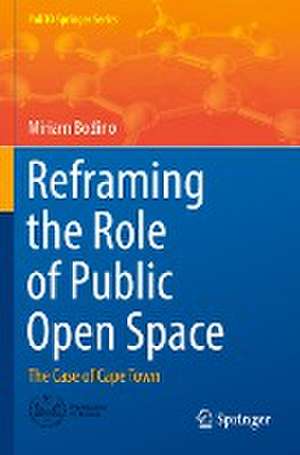Reframing the Role of Public Open Space: The Case of Cape Town: PoliTO Springer Series
Autor Miriam Bodinoen Limba Engleză Paperback – 28 feb 2023
| Toate formatele și edițiile | Preț | Express |
|---|---|---|
| Paperback (1) | 573.62 lei 38-44 zile | |
| Springer International Publishing – 28 feb 2023 | 573.62 lei 38-44 zile | |
| Hardback (1) | 698.30 lei 3-5 săpt. | |
| Springer International Publishing – 27 feb 2022 | 698.30 lei 3-5 săpt. |
Din seria PoliTO Springer Series
- 15%
 Preț: 638.43 lei
Preț: 638.43 lei - 20%
 Preț: 646.80 lei
Preț: 646.80 lei - 20%
 Preț: 552.17 lei
Preț: 552.17 lei - 20%
 Preț: 545.73 lei
Preț: 545.73 lei - 18%
 Preț: 1119.38 lei
Preț: 1119.38 lei - 23%
 Preț: 607.31 lei
Preț: 607.31 lei - 20%
 Preț: 594.72 lei
Preț: 594.72 lei - 18%
 Preț: 785.42 lei
Preț: 785.42 lei - 15%
 Preț: 640.37 lei
Preț: 640.37 lei - 20%
 Preț: 552.06 lei
Preț: 552.06 lei - 18%
 Preț: 1220.12 lei
Preț: 1220.12 lei - 18%
 Preț: 1001.65 lei
Preț: 1001.65 lei - 18%
 Preț: 718.15 lei
Preț: 718.15 lei -
 Preț: 436.56 lei
Preț: 436.56 lei -
 Preț: 385.84 lei
Preț: 385.84 lei -
 Preț: 383.12 lei
Preț: 383.12 lei - 15%
 Preț: 638.43 lei
Preț: 638.43 lei - 18%
 Preț: 886.62 lei
Preț: 886.62 lei
Preț: 573.62 lei
Preț vechi: 754.76 lei
-24% Nou
Puncte Express: 860
Preț estimativ în valută:
109.76€ • 114.91$ • 90.82£
109.76€ • 114.91$ • 90.82£
Carte tipărită la comandă
Livrare economică 01-07 aprilie
Preluare comenzi: 021 569.72.76
Specificații
ISBN-13: 9783030943257
ISBN-10: 3030943259
Pagini: 176
Ilustrații: VI, 176 p. 109 illus., 77 illus. in color.
Dimensiuni: 155 x 235 mm
Ediția:1st ed. 2022
Editura: Springer International Publishing
Colecția Springer
Seria PoliTO Springer Series
Locul publicării:Cham, Switzerland
ISBN-10: 3030943259
Pagini: 176
Ilustrații: VI, 176 p. 109 illus., 77 illus. in color.
Dimensiuni: 155 x 235 mm
Ediția:1st ed. 2022
Editura: Springer International Publishing
Colecția Springer
Seria PoliTO Springer Series
Locul publicării:Cham, Switzerland
Cuprins
Introduction.- Defining the framework: geographical context.- Defining the framework: theoretical context.- Cape Town and the pursuit of inclusion.- Learning from Cape Town desegregation: Khayelitsha.- Conclusions.
Textul de pe ultima copertă
This book explores the growing spatial inequality in contemporary cities, and the opportunity of reframing the role of public open space as a tool of inclusion in a context of an increasing economic gap between the urban poor and rich. The first part outlines the geographical and theoretical frames of reference, which are then tested in the analysis of a case study: Cape Town. This city in South Africa was selected since its spatial aspects of separation are particularly evident due to the legacy of both apartheid and modernism. The examination of the policies of the City of Cape Town confirms the rising attention to public space since the 1990s. This slow progress of desegregation is tested through a critical study of one of the most disadvantaged areas of the city, Khayelitsha. The book explores the relevance and impact of an urban-design project, and reframes the role of public open space not only as a tool for restructuring the apartheid city, but also for reinterpreting other fragmented contemporary cities.
Caracteristici
Explores the spatial dimension of the phenomenon of inequality Demonstrates that public space can be used as a social infrastructure to bridge divides Presents timely topics such as urban inclusivity and spatial inequality
